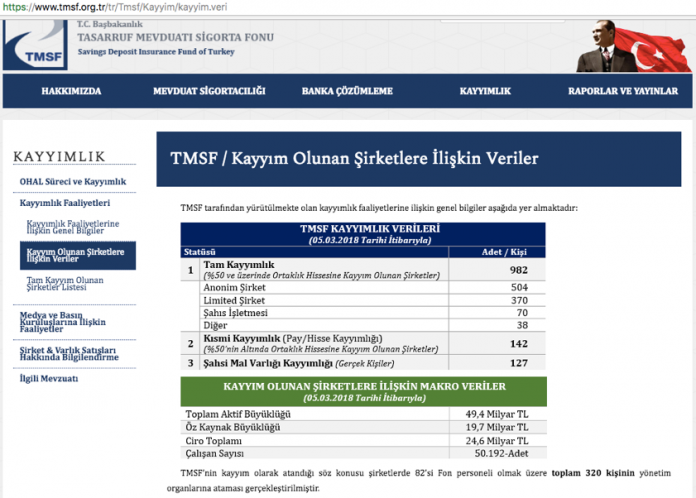It has been almost two years since the Turkish government declared a state of emergency in the wake of the attempted coup. Since 21 July 2016, the Turkish government has been using the emergency rule to intervene and restrict all fundamental human rights.
At the very beginning of the state of emergency rule, on 23 July 2016, 934 private schools, 109 dormitories, 35 hospitals, 15 private universities, 16 unions, 104 foundations, 1125 associations were dissolved and all their assets including real estates, chattel goods, bank accounts, intellectual properties and other financial assets were transferred to public treasury. As of today, 4100 profit-oriented or non-profit legal entities were dissolved, and their assets were confiscated under decree laws without any judicial procedure.


Graphic-1-2: IHOP– http://www.ihop.org.tr

Graphic-3: IHOP – http://www.ihop.org.tr
According to Mehmet Ozhaseki who is Minister of Environment and Urban Planning, the total value of the real estates confiscated from the dissolved legal entities is 15 billion Turkish Liras. There is not any reliable report available about the value of those entities’ other assets such as brand values, intellectual properties, chattel goods etc.
Another aspect of the violation of the right to property is suspending proprietors’ rights by assigning trustees to companies and foundations. Erdogan Regime has been using anti-terror laws for it. Article 133 of the Turkish Criminal Procedure Code (TCPC) which was applied only once from the date it entered into force (2005) to 2015; has been being used roughly by Erdogan Regime to exterminate its dissidents since the October of 2015. Under Article 133 of the TCPC, if one of its shareholders or the company itself is being investigated for offences related to terrorism, the company may be seized by appointing the trustee with the decision of the Peace Criminal Judge.
The first victim of the widespread seizing practises was Koza Ipek Holding: a conglomerate of 22 companies, including a media group with two TV channels and two daily newspapers. The holding was seized by Erdogan Regime on the 26th October 2015 and the management of all of its enterprises were given to a pro-government trustee board. According to our survey from October 2015 to 15th July 2016 in the 37 provinces of Turkey 412 enterprises which were being run by 273 separate companies were seized
Under the emergency rule Erdogan Regime’s policy of seizing assets of dissidents went into new phase; with new emergency decrees, the company seizing policy was centralized, the Savings Deposit Insurance Fund (SDIF / TMSF) was authorized to run and liquidate (without waiting for the end of jurisdiction) the seized companies.

Graphic-4: The Arrested Lawyers Initiative
Since 15th July 2016, 1124 companies were transferred to the SDIF. According to our survey, at least 850 of them were seized after the failed coup attempt. These 1124 separate companies are running thousands of branches. For instance;
• Suvari Giyim Co (clothing company) seized by decision of Adana Peace Criminal Judge has 148 branches in 14 different countries,
• Boydak Holding seized by decision of Kayseri Peace Criminal Judge is running 34 separate companies; only 2 of its 34 companies, Bellona and Istikbal have 1240 furniture (franchise) stores across the world. Boydak Holding employs 13000 workers and creates (indirectly) 110000 jobs.
• Other large companies which are among the largest 500 of Turkey such as Koza, Dumankaya, Akfa, Orkide, Sesli, Naksan were seized and transferred to the SDIF too.
As of today (4 June 2018), the SDIF controls and manages seized 1124 companies, and also assets of 127 persons. As announced in the web site of the SDIF, total worth of the seized companies is 49.4 billion Turkish liras.

Seized companies are active in all areas of business and trade life such as investment, mining, petrol distribution, automotive, auto-gas, energy, transportation, food, agriculture, home textile (curtain, carpet), furniture, jewellery, pharmacy, stationery, financial consulting, law, hardware, metal industry, decoration, delivery service, information technologies and many others.
The Erdogan Regime has systemically been impoverishing dissidents by either seizing their assets or confiscating them outright in blatant abuse of the emergency rule which has recently been extended for the seventh time. According to official statements by the SDIF (Savings Deposits Insurance Fund) and minister Mr. Ozhaseki, the total value of assets confiscated by the Turkish Government is 65 billion Turkish liras (12 billion Euros). The figure does not include value of the seized assets of 127 persons, the dissolved entities’ (19 unions, 15 private university, 49 hospitals, 145 foundations, 174 media outlets, 1419 foundations and other 2271 education companies such as dormitories, prep schools, private schools) confiscated chattels. It can increase up to 100 billion Turkish liras if those asset values are included.
Arbitrary violations of rights to property do have devastating effects on a county’s prospects of economic development. Insecurity among investors, domestic or otherwise, as to their investments often result in serious economic crises in countries like Turkey which is heavily dependent on foreign investments and consequently impoverish not only dissidents but also supporters of their respective regimes.
www.arrestedlawyers.org
@ArrestedLawyers

